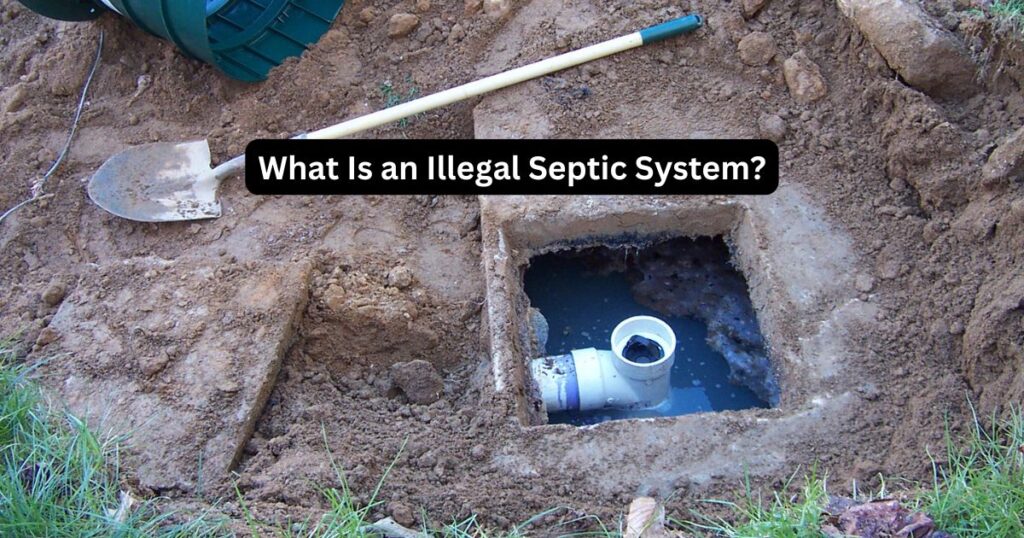An illegal septic system is one that does not meet local health, safety, or environmental regulations. These systems may have been improperly installed, maintained, or even built without the necessary permits.
Illegal septic systems can pose serious risks to public health and the environment. They may lead to groundwater contamination, spread disease, or pollute nearby bodies of water.
Let me explain more about what makes a septic system illegal, the risks involved, and how to avoid these issues.
Signs of an Illegal Septic System
An illegal septic system often displays certain warning signs. These include:
- No permit or inspection documentation
- Leaks or drainage problems
- Incomplete or improper installation
- Evidence of pollution or contamination
If you notice any of these signs, your system may not meet legal requirements. It’s important to take action to resolve these issues quickly.
Common Violations
Illegal septic systems often violate local or state regulations in the following ways:
- No Permit or Approval
Many illegal systems are installed without getting the required permits. A permit ensures that the system design is safe and follows local codes. - Improper Design
A septic system must be designed according to specific guidelines, including proper tank size and drain field placement. Illegal systems often do not meet these standards. - Poor Installation
An improperly installed system may fail to treat wastewater correctly. This increases the risk of pollution or system failure. - Lack of Regular Maintenance
Regular pumping and inspections are critical for a healthy septic system. Illegal systems may not get the care they need, leading to problems over time. - Close Proximity to Water Sources
Septic systems need to be a safe distance from wells, lakes, or streams. Systems installed too close to these areas can contaminate drinking water or harm the environment.
Risks of an Illegal Septic System
Illegal septic systems create a range of risks, including:
- Health Hazards
When wastewater isn’t treated properly, it can release harmful bacteria and viruses into the environment. This can contaminate drinking water and cause illness. - Environmental Damage
Leaking or poorly maintained systems can release pollutants into nearby water bodies. This can harm fish, wildlife, and local ecosystems. - Legal Consequences
Homeowners with illegal septic systems may face fines, penalties, or even lawsuits. Local authorities may also require costly repairs or replacements to bring the system up to code. - Property Value
Illegal septic systems can lower property values. Potential buyers may be reluctant to purchase a home with a non-compliant system, knowing they’ll need to fix it. - System Failure
Illegal systems are more likely to break down, leading to expensive repairs or even full replacement. A failing system can create unpleasant smells, backups, or unsanitary conditions in your home.
Penalty for Illegal Septic System
Homeowners with an illegal septic system can face various penalties, depending on local laws and the severity of the violation. Common penalties include:
- Fines
Local health departments or environmental agencies may issue fines for illegal septic systems. These fines can range from a few hundred to thousands of dollars, depending on the violation. - Stop Work Orders
If an illegal septic system is discovered during construction or renovation, authorities may issue a stop work order. This halts all construction until the system is brought up to code. - Environmental Damage Compensation
If the illegal system causes environmental harm, such as water contamination, the homeowner may be held responsible for cleanup costs. This can add up to significant financial penalties. - Required Repairs or Replacement
Homeowners may be required to repair or replace their illegal septic system. In some cases, this can involve installing a new system that meets local regulations. These costs can be quite high, especially for larger properties or systems in difficult locations. - Legal Action
If the illegal septic system leads to public health or environmental hazards, homeowners could face lawsuits from neighbors, environmental groups, or local authorities. - Denial of Property Sales
An illegal septic system can also prevent the sale of a property. Before selling, many jurisdictions require a septic system inspection. If the system fails the inspection, the sale cannot proceed until the issue is resolved.
How to Tell If You Have an Illegal Septic System
There are several ways to determine if your septic system is illegal. First, check with your local health department or environmental agency. They can provide records of permits and inspections for your property.
Second, look for signs of a poorly functioning system, such as slow drains, soggy ground, or foul odors. These are often symptoms of an improperly installed or maintained system.
Finally, hire a licensed septic system professional to inspect your system. They can identify any issues and recommend steps to bring the system into compliance.
How to Fix an Illegal Septic System
If you discover that your septic system is illegal, take action right away. Here are the steps you can follow:
- Contact Local Authorities
Your local health department or building inspector can provide guidance on how to bring your system into compliance. They may require permits, inspections, or repairs to ensure your system is safe and legal. - Hire a Licensed Professional
A qualified septic system installer can inspect your system and recommend necessary repairs or upgrades. They will ensure that the system meets local codes and environmental standards. - Follow Maintenance Guidelines
Regular septic system maintenance is critical for keeping the system functioning properly. Pump the tank as needed, typically every three to five years, and schedule inspections to catch any problems early. - Install a New System If Necessary
In some cases, the best solution may be to replace the system entirely. This can be expensive, but it’s often the safest and most effective way to resolve serious issues.
How to Avoid Installing an Illegal Septic System
If you’re building a new home or upgrading an existing septic system, follow these tips to avoid common mistakes:
- Obtain Necessary Permits
Before installing a septic system, check with your local authorities to determine the permits and approvals required. These ensure your system will meet local regulations. - Choose a Licensed Installer
Always hire a qualified, licensed septic system professional to design and install your system. They have the training and experience to avoid costly mistakes. - Schedule Regular Maintenance
Proper care and maintenance will keep your system functioning smoothly. This includes regular pumping, inspections, and repairs when needed. - Follow Local Guidelines
Every area has specific regulations for septic systems. These cover everything from the size of the tank to the placement of the drain field. Make sure your system follows these rules to avoid problems later.
FAQs About an Illegal Septic System
Are Septic System Seepage Pits Illegal?
No, septic system seepage pits are not illegal everywhere, but many areas have banned them due to potential groundwater contamination. Local regulations often require modern alternatives like leach fields, which are more efficient at treating wastewater. Always check with local health departments to ensure compliance with septic system laws.
Can You Sell a Property with an Illegal Septic System?
Selling a property with an illegal septic system can be difficult. Many jurisdictions require the system to be brought up to code before a sale. Buyers may also demand repairs, and failing to disclose an illegal system could lead to legal consequences for the seller.
Does a Warranty Deed Protect from an Illegal Septic System?
No, a warranty deed guarantees clear title but doesn’t protect against an illegal septic system. It only ensures that the seller has legal ownership of the property. Buyers should request a septic system inspection to verify legality and compliance with local laws.
Is It Illegal to Have an Open Septic Tank or Open Septic System?
Yes, it is illegal to have an open septic tank or open septic system in most areas. Open systems pose serious health and safety risks, including contamination and exposure to harmful bacteria. Properly securing septic tanks is required by law to protect public health.
Is It Illegal to Pump or Drain Your Own Septic Tank?
No, in many areas, it is not illegal to pump your own septic tank, but it is strongly discouraged. Septic tank pumping requires specialized equipment and knowledge to avoid spills, contamination, or system damage. Local laws may require a licensed professional for this task. Always check with local regulations before attempting to pump or drain your tank.
Do You Have an Illegal Septic System? Get it Fixed Today
An illegal septic system poses serious risks to both homeowners and the environment. By understanding what makes a system illegal, you can take steps to avoid common mistakes and ensure your system complies with local regulations.
If you suspect your system may be illegal, contact a licensed professional or local authorities to address the issue quickly. Keeping your septic system in compliance protects both your health and your property value.
Preventive action, regular maintenance, and professional installation are key to avoiding an illegal septic system.

